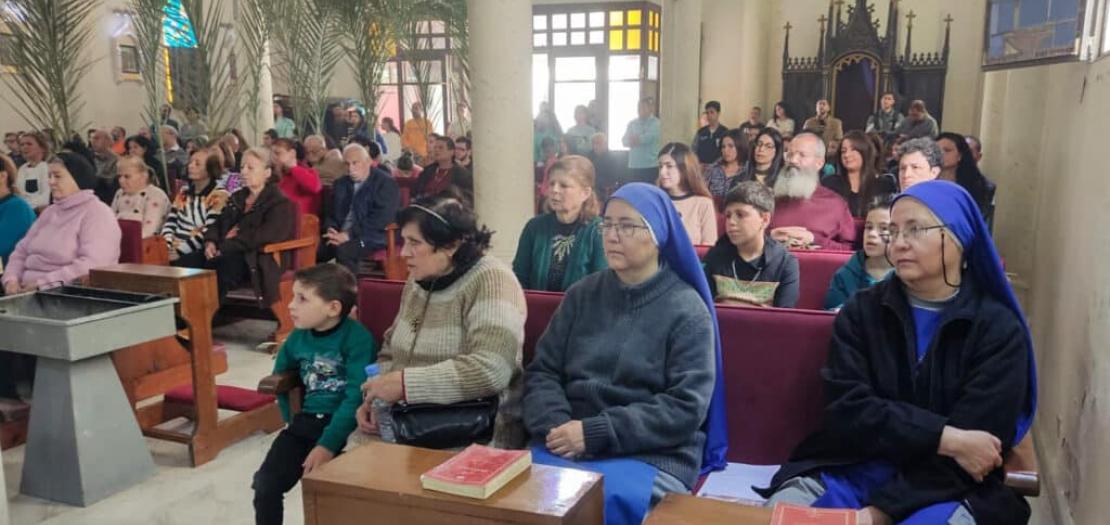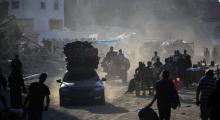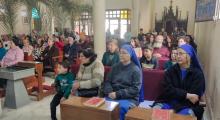Issued by the Catholic Center for Studies and Media - Jordan. Editor-in-chief Fr. Rif'at Bader - موقع أبونا abouna.org

There is something of the Friar Tuck about Fr. Gabriel Romanelli. He is a rotund and balding Argentinian who exudes infectious joy. He is blessed with an innocent sense of fun which comes, perhaps, from recognizing the beauty of life and of creation in the midst of the suffering around him. He is a man who can easily make you wonder if he is perhaps one of the pure of heart whom Jesus said can “see God”.
Without doubt, he is also a man who can see suffering. As a parish priest of the Church of the Holy Family, he suffers for his small flock, which before the war numbered 135 people out of an overall Gaza population of 2.3 million and which are now fewer because some have died and others have fled.
“We have lost 33 people and I knew everyone,” he says mournfully in the same Buenos Aires dialect spoken by Pope Francis. “They were my family.”
Now, he is deeply fearful that the ancient Palestinian Christian community of Gaza might disappear altogether as the conflict continues without any end in sight. Together with the Greek Orthodox Church, there were 1,017 Christians in Gaza on the eve of the war.
When the Israeli army attacked Hamas militants, many Christians took shelter in the Holy Family compound that, besides the church and presbytery, also houses a school and sports facilities, a convent of Missionaries of Charity sisters and an orphanage.
“The highest number [sheltering] was 700,” Fr. Romanelli told journalists during a pastoral visit to London.
“Now we have about 500, mostly Greek Orthodox. We have lost by death 33 people, more than three per cent of our Christian community in Gaza.
“Twenty of them were killed, 17 inside the compound of the Greek Orthodox Church of St Por phyrius during bombing by the Israeli army which made the wall collapse.
“Thirteen have died from lack of medicine and they include seven children and some old people. About 260 Christians have left the Gaza Strip by different ways but always via the south. We have lost 25 per cent of our Christian community.”
Three Catholics were killed by Israeli snipers, two of them in the church compound when they were on their way to a bathroom.
Fr. Romanelli says that nowhere is safe in Gaza. He continues: “For 2,000 years the Christian community was there – in different ways, but always there. Now the risk of disappearance is real.
“The Patriarch and other religious leaders want us to stay because the Christians are a necessary element of Palestinian society.
“Even under risk it is a good thing for the majority of the population, and it’s also a worthy thing, a good thing, for Israeli society to be partners with Palestinian, Christian and Muslim society.
“I hope that the presence of the Church continues,” he adds. “At the same time, I want the best for my brothers and sisters.
“The people who choose to go have our blessing and I also pray that in the place that they arrive in – the United States, Canada, Spain, Egypt, Jordan or wherever – they continue to preserve their Christian identity.
“Even if we are fleeing, if we lose Jesus – our faith – along the way, then we have lost the most important thing to us.”
He said he expected more Palestinian Christians to flee the territory in the weeks and months ahead.
Fr. Romanelli said: “At the beginning of the war the majority of them desired to stay there to rebuild the society, but now many of them are depressed because they lost their houses and the houses of their relatives, their places of work and their jobs themselves, the schools of their children, their streets and their restaurants.
“Yet in spite of all that, still no-one knows where it will end.”
He added: “It is hard because we are a people of peace. We want peace for Israel. We want peace for Palestine. We love everyone. Our presence there is a good thing for all the region.”
The Pope, he said, is so troubled by the conflict and anxious for the safety of civilians that he “communicates every day” with the Christian community in Gaza, speaking by telephone either to Fr. Romanelli or Fr. Yusuf Assad, his Egyptian assistant priest.
Fr. Romanelli said: “Usually, it’s a very small communication to show his closeness to the community, to pray, to manifest his work for peace between the Palestinians and Israel, to desire the ceasefire – many times he has prayed for that – to ask ‘please protect the children’, to be a strength.
“He speaks to me in dialect because he is from Buenos Aires and I am also. He gives blessings sometimes. If he calls the parish, sometimes people can say ‘hi’ and a few days ago someone presented a newborn baby to him."
People in the West can help principally by prayer and charity and by also lowering the angry tone so that a climate of peace might supplant the atmosphere of war, the priest added.
“Pray and ask for prayers in the Holy Mass and to Our Lady,” he urges solemnly.
“Speak about this with wisdom and charity. We can make many good things with our tongues but we can also destroy a lot. This is the best step in making the situation calmer.
“Also, help through [giving to] the general appeal of the Latin Patriarch. [The aid] is effective. It arrives, and we try to help the largest number of people.”
He is most animated and at his warmest and jolliest when he reflects on the strong belief in the Resurrection that gives him the hope that the darkness of the conflict will soon pass, saying that in Gaza children are taught to adore Christ in the Eucharist as their Savior.
The priests and the sisters, he says, “teach children to love Jesus… tell them that this is Jesus the Lord who said, ‘This is my Body’ and that if Gaza is not a hell it’s thanks to Jesus”, and that at Easter “we remembered with tears the death of Christ and the deaths of our beloved but we knew we must celebrate the Resurrection, the empty tomb”.
“We are the sons and daughters of Calvary and also we are the sons and daughters of the Resurrection,” he says with great enthusiasm as a smile breaks across his face, brightening his entire aspect.
“It’s the mystery of our faith. Not only do we fix our attention on the negative things – on the cross and the death – but also on the rising. We can bring his mystery to Gaza. Jesus is with us not as an image, but as a reality.”







